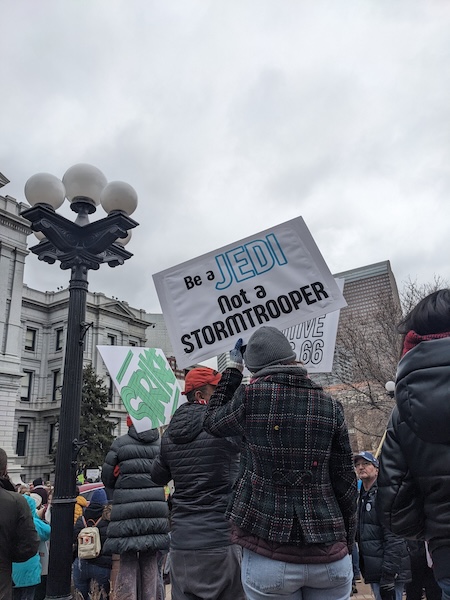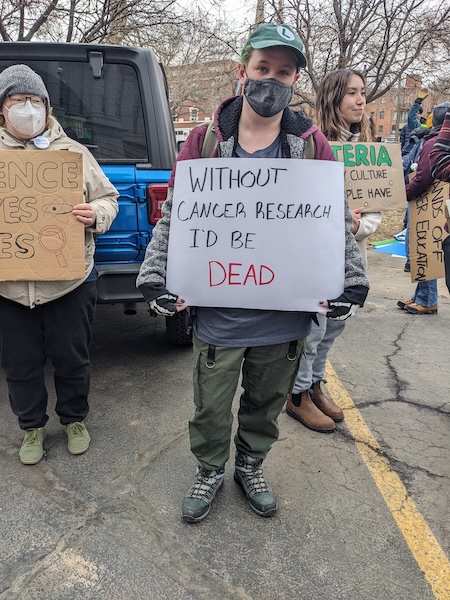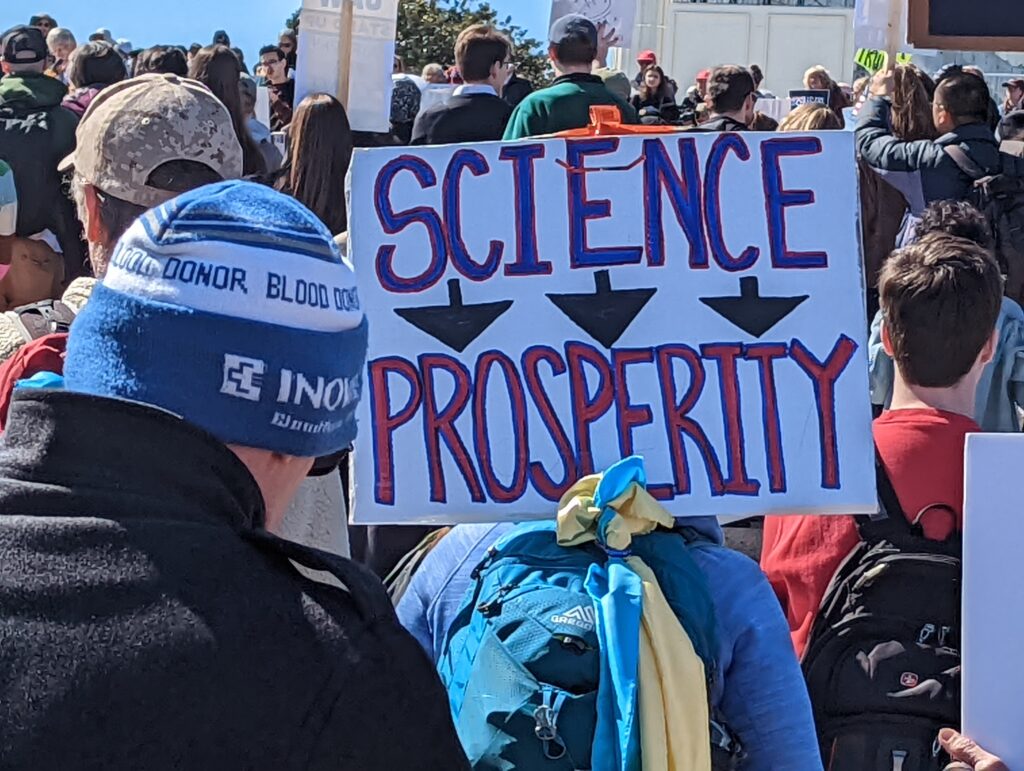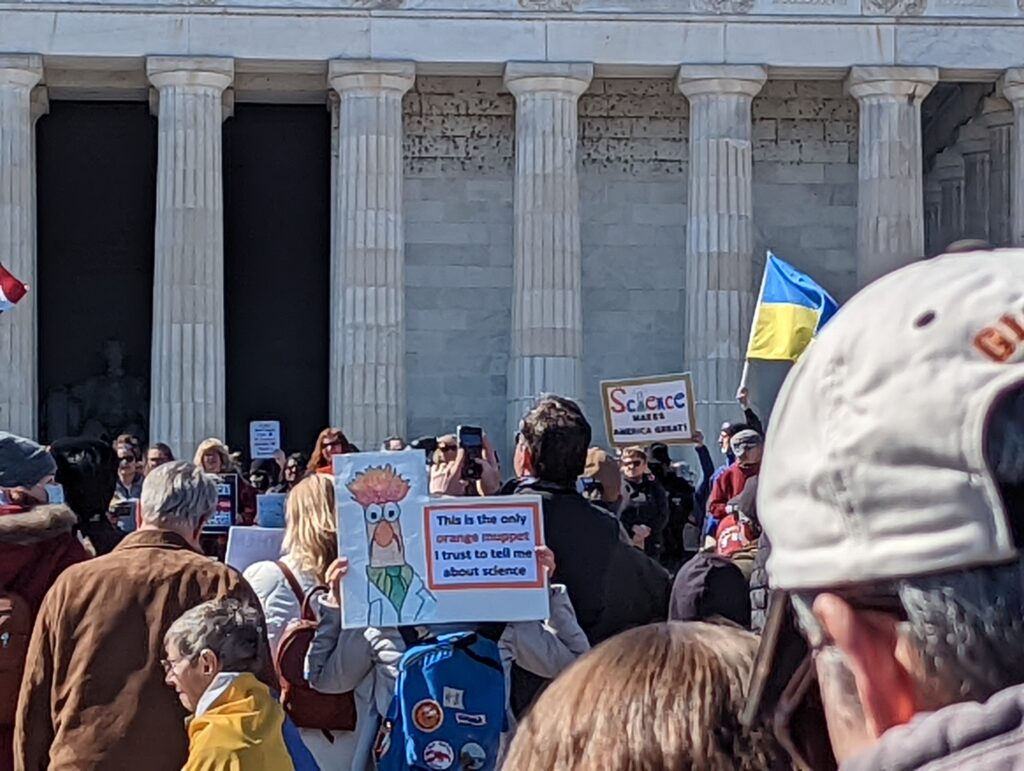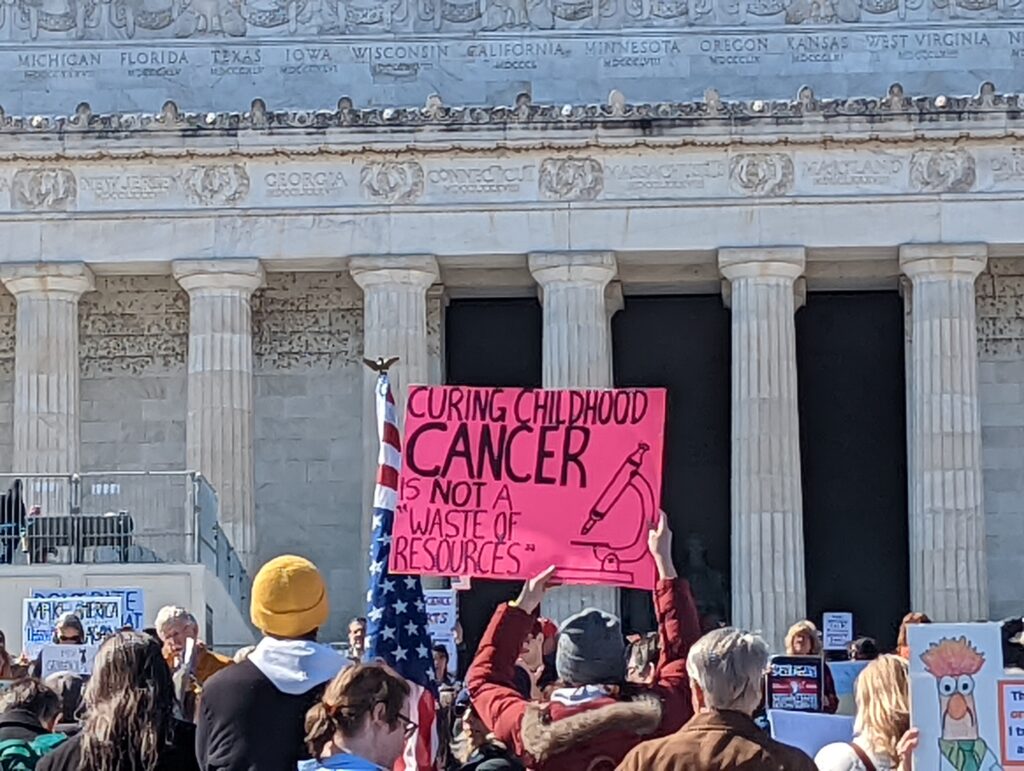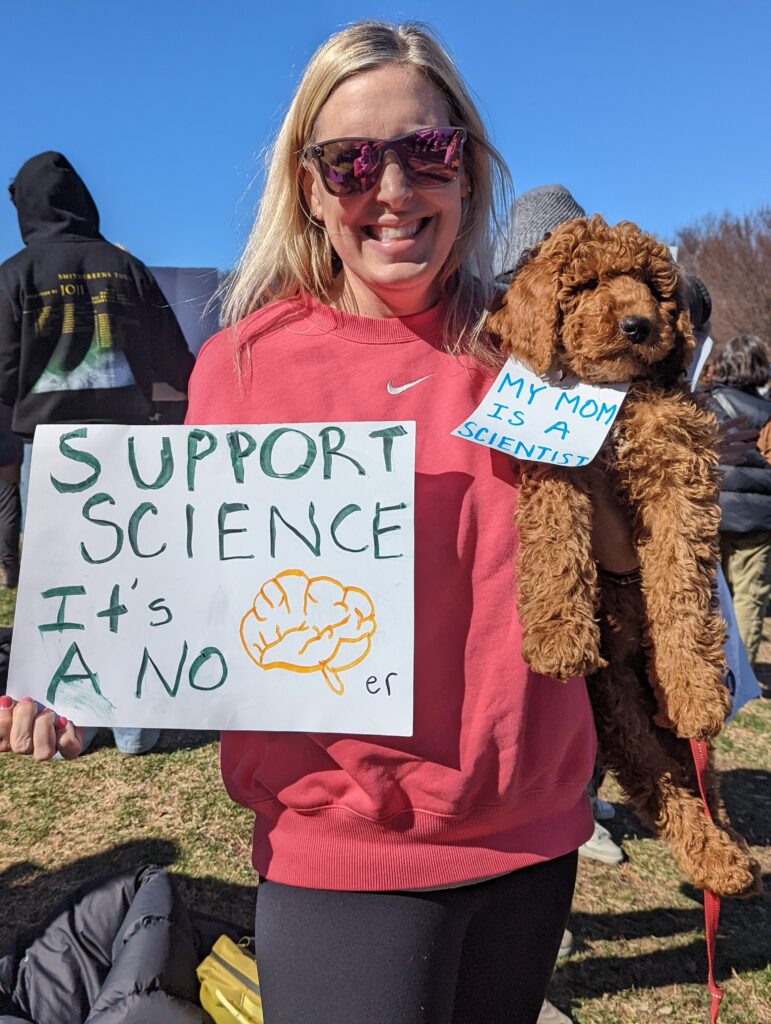Update from San Francisco: To close out the event, bioinformatician Calla Martyn read an extensive list of specific actions people can take in defense of science. She started with holding elected leaders to account. “I know you’ve heard it 1000 times. I’m gonna say it again. You gotta contact your elected officials, tell them to urgently fight back the attack on scientific freedom and funding.”
She spoke about fighting misinformation and sharing science. “Speak up when you hear misinformation…You may not convince the person you are speaking to, but others are watching and listening closely.”
Science is not just about being in a laboratory or doing experiments. Martyn listed things science-admirers can do to help. “Look around you. If you didn’t know a scientist, you do now. On your way out, ask them about their work. They’ll be ecstatic.” She also mentioned everyday actions that keep science alive: “Read science books. The library is right behind you. Ask a librarian. Go to science museums. Join a citizen science program.”
Then she turned to address scientists, calling on them to talk about their work, recruit and train the next generation of scientists, band together, and resist all efforts to dismantle scientific work. “Do not save your influence for a better opportunity. It’s not going to come.”
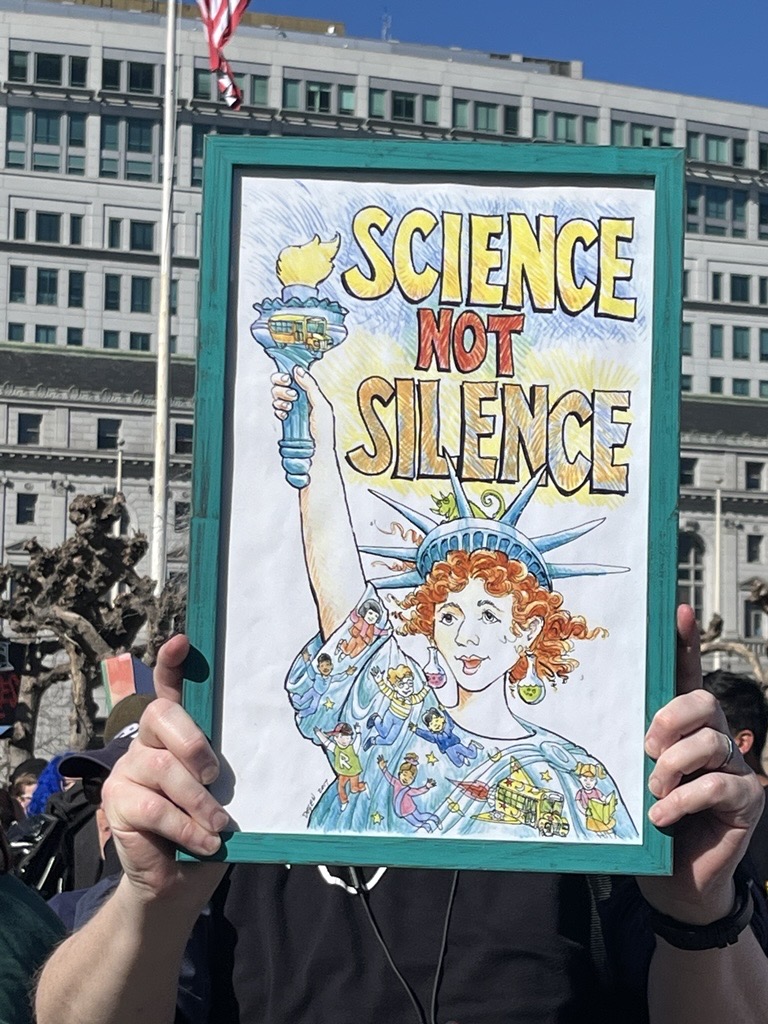
Update from San Francisco: Earlier in the rally, California State Senator Scott Weiner brought the issues home.
“It’s not just a coincidence that the Bay Area has been an epicenter for tech innovation,” Weiner told the crowd. Silicone Valley hosts major technology companies such as Google and Meta and a vibrant tech startup scene. The San Francisco Bay Area is also home to several research universities and institutions. Weiner said that it’s because of the scientists and the research happening that the region has prospered.
“If the federal government continues to abandon science and advocates, we in California need to seize that opportunity and become even bigger leaders internationally in this state for science and for research,” he said.
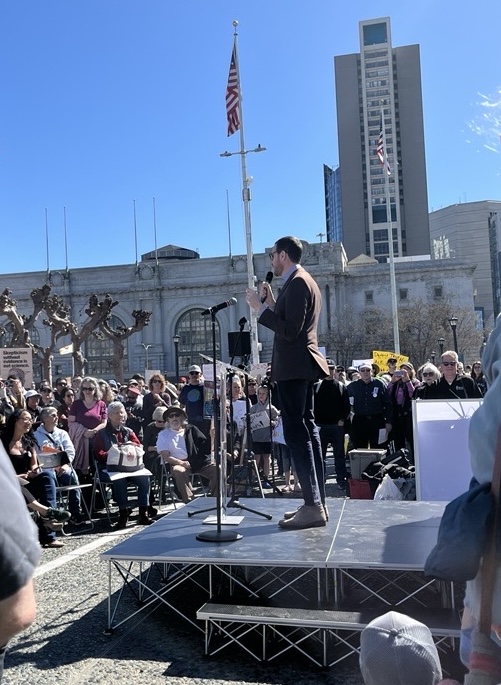
Update from Washington, D.C.: Michael Mann, climate scientist, author, and science advocate at the University of Pennsylvania in Philadelphia, took to the podium to share lessons learned from his own career. Mann has frequently come under attack from climate-denying groups for his work publishing the now-famous hockey-stick diagram that describes the severity of the climate crisis.
“But this is the most challenging moment I can recall for science itself,” Mann said. “Science is under siege.”
Mann invoked two pro-science historical figures—scientist and revolutionary Benjamin Franklin and National Academy of Sciences founder President Abraham Lincoln. These examples were to make clear that defending science and one’s country go hand in hand, and that today’s Republicans can and should follow in the footsteps of the first Republican president.
“Lest you think that pro-science Republicans are a thing of the past, two of the heroes in my own personal story are Republicans,” Mann said. When his science and personal safety were under assault, he said, Republican Sen. John McCain and Rep. Sherwood Boehlert came to his and his colleagues’ defense.
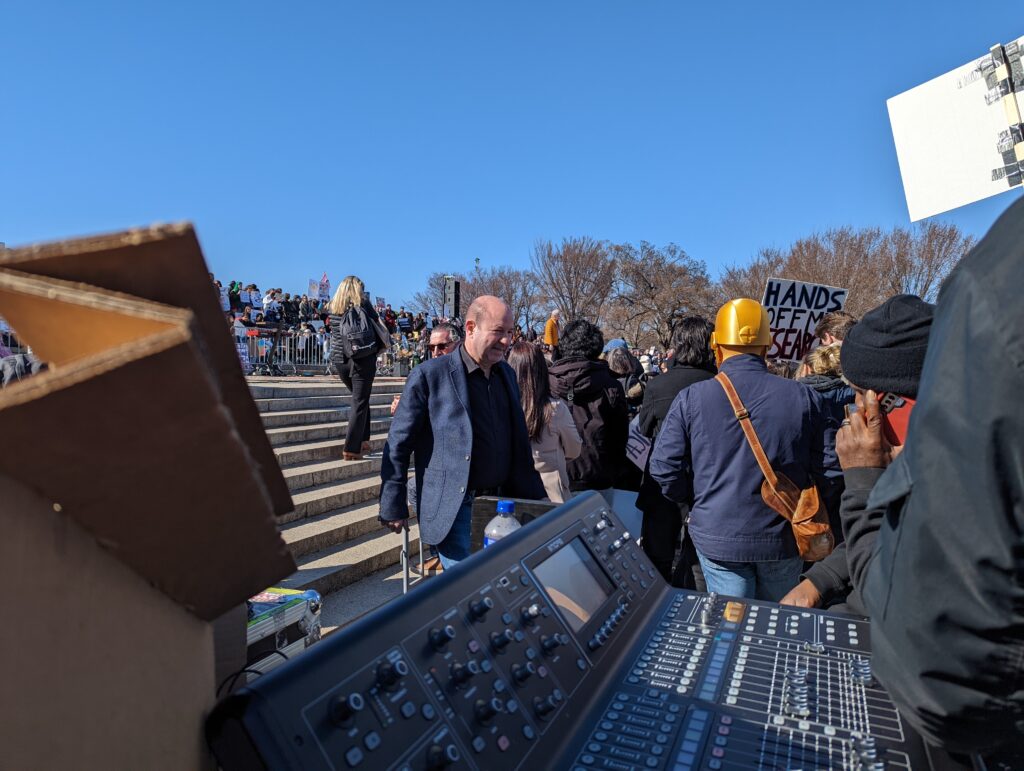
A few elected Republicans spoke at a the D.C. rally, including former Michigan Rep. Fred Upton. These inclusions gave Mann hope.
“Let’s do all we can to bridge the partisan divide,” he said. “Not all will be willing to cross. We know that. But I truly believe that we can bring over enough to create a critical mass in support of science and science-based discourse. The stakes couldn’t be greater. They are no less than the future of our country, and indeed our civilization.”
Several hundred people remained as the D.C. program neared the end. Speakers near the end of the program reiterated the main themes of the day: that science saves lives, that science is for everyone, and that now is the time to stand up to defend science.
During the D.C. rally, Eos ran into a familiar face, former AGU CEO Chris McEntee. McEntee was attending the rally as a concerned citizen.
“I believe in science, I support science, and I think what’s happening in this country is setting us back to the Dark Ages,” McEntee said. “We have to not be afraid to speak up and say what we stand for, because I think the current administration wants us to be afraid. And I get it, why people are afraid, but that’s not going to help the situation.”
“I’m concerned about diversity, equity and inclusion,” she said. “I’m concerned about women’s rights. I’m concerned about health care. I’m concerned about scientific research in general.”
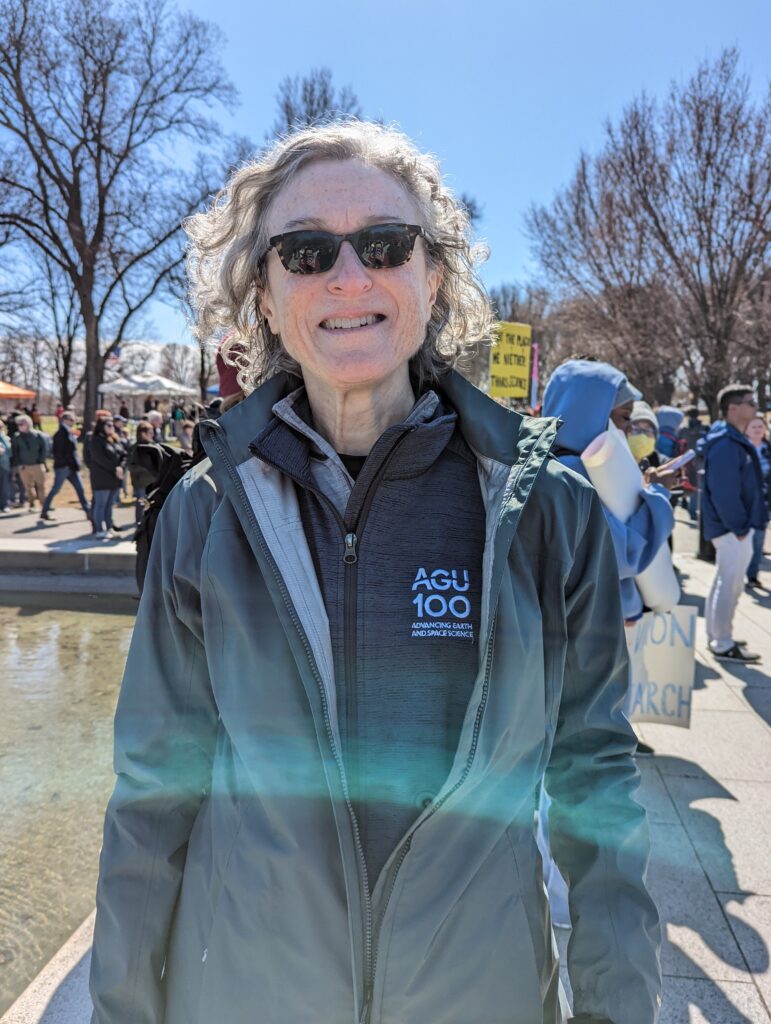
She applauded AGU joining a lawsuit defending fired federal workers. “AGU has a lot of power all around the world,” McEntee said, “and I hope that [it will] continue to really be very forceful and support their members who are really, really suffering under this new administration.”
Update from Denver: Snow began falling in Denver as musician Andie Duzarte closed out the Denver rally with a rendition of “Rise Up” by Andra Day.
“Thank you so much for having me,” she said. “Keep doing what you’re doing. It’s really important.”
Update from San Francisco: An organizer asked the crowd “Are you angry?” Cheers. “Are you ready to fight back?” More cheers.

Update from Lansing:
Update from San Francisco: Brian Cassidy, a patient advocate, got emotional as he told rallygoers his story of battling relapses of non-Hodgkin lymphoma. He searched and found a clinical trial and is now 10 years in remission.
“The reason I am on stage, the reason I have helped organize this event is because I am so effing grateful to the amazing people who do the amazing things and do the amazing research. And now they’re being assaulted,” he said.
“Screw this ‘Make America great’ bullshit,” he said. “Science makes the world great.”
Update from Austin:
Update from San Francisco: Marian Walker, an early-career environmental scientist, spoke about programs that ensured she and other scientists had access to the resources they need to succeed in research.
“Today we are watching federally funded, paid summer research experiences for undergraduates, otherwise known as REUs, available to all students regardless of their background, being defunded, threatened, canceled, and suspended, alongside targeted DEI educational programs,” she said.
Update from San Francisco: Organizers led the crowd in a chant:
“From the lab to the street,
trust in science not deceit.”
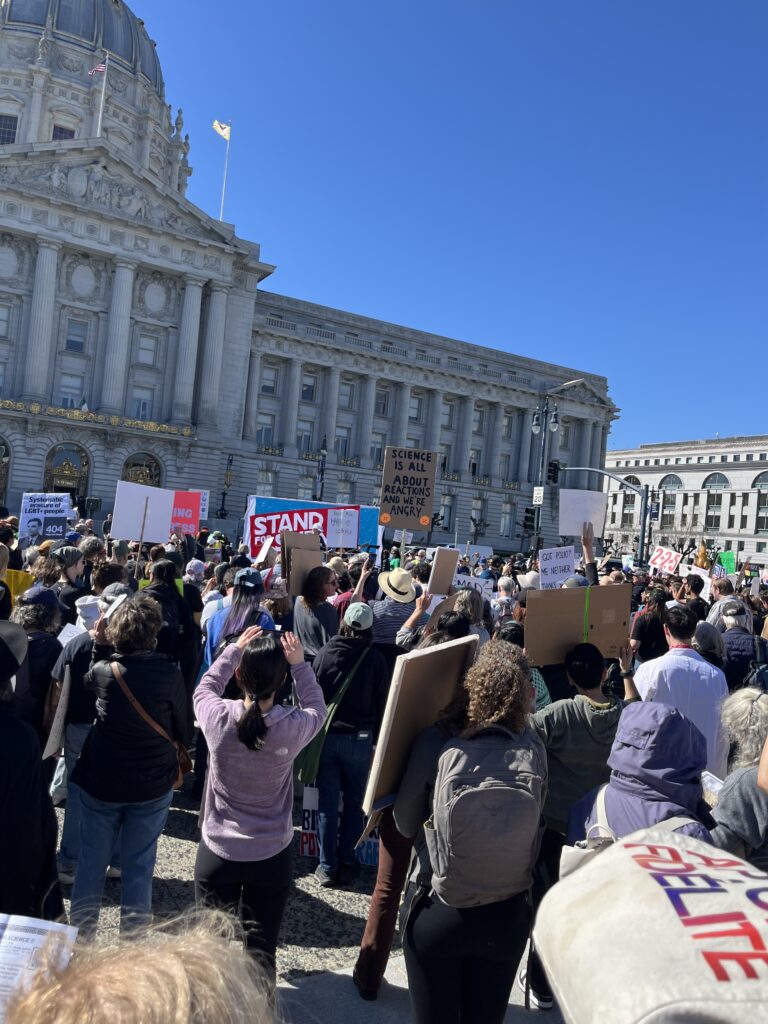
Steve Goodman, a professor at Stanford in epidemiology and medicine, spoke to the crowd about how great it was to see so many people standing for science. Then he asked, “Are you willing to sing for science?” Cheers erupted.
The crowd sang along as he performed a modified version of “This Land is Your Land” with the refrain “Science is good for you and me.”
Update from Denver: Jonathan Velotta, an evolutionary biologist at the University of Denver, spoke about the changing view of scientists held by the federal government. He specifically called out MIT engineer Vannevar Bush, who headed the U.S. Office of Scientific Research and Development during World War II and called science “the endless frontier.”
“Where we were once viewed by the government as bastions of understanding, we are now … viewed as a threat to the administration and its agenda,” Velotta said.
“They’re right” shouted a crowd member. “We are!”
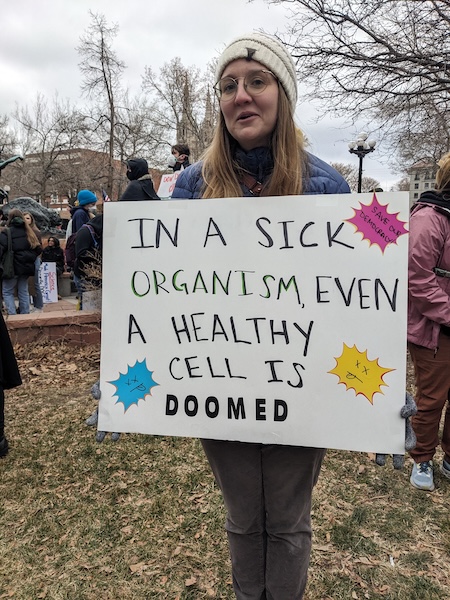
Erin Welsh, a disease ecologist, epidemiologist, and producer and cohost of the podcast “This Podcast Will Kill You,” took the stage to talk about the dangers of vaccine hesitancy.
“How much smaller would this crowd have been if vaccines were not invented?” she asked the crowd. “We cannot afford to forget what the world was like before vaccines, antibiotics, insulin, pasteurization, cancer screening, and the millions of other scientific advancements made possible only by basic scientific research.”
Update from Nashville:
Update from Denver: Crowds in Denver were shivering, but Carlos Alvarez-Aranyos fired them up. The founder of American Opposition, a nonprofit “created to counter the rise of fascism in the United States of America,” grew up in the Dominican Republic. He lived under Joaquín Balaguer, whom he called an “elected fascist who did everything Donald Trump is trying to do.”
“It never stops at the scientists,” Alvarez-Aranyos said. “They’re coming for our health, our safety, the environment, the economy, and the very foundations of our society.”
He was shouting to a cheering crowd by the end of his speech, when he exclaimed, “They will never succeed!”
Update from San Francisco: Seth Shostak, senior astronomer at the SETI Institute, said he remembers waking up the morning the world found out that the Soviet Union had launched the first satellite, Sputnik, into space. The United States found itself way behind, he said. “I think there’s a lesson in that.”
“Science invents the future,” he said. “Science is what will guide the succeeding generations. So we have to support it.”
Update from Denver: Aaron Weiss is the deputy director of the Center for Western Priorities, a conservation and advocacy nonprofit. In his speech, he referenced the They Might be Giants song “Science is Real.”
“Fascism thrives on lies,” he said. “Democracy itself depends on reality. It depends on facts. It depends on science, because…”
The crowd joined him to chant, “Science is real!”
Update from San Francisco: Mary Lou Zoback, a geophysicist and member of the National Academy of Sciences, gave the crowd an example of why the science happening at agencies such as the USGS, NOAA, and NASA is critical for avoiding disasters. In the 1960s, scientists recognized the proposed Trans Atlantic Pipeline would be vulnerable to thawing permafrost and active faults that crosscut its path. Changes to the design as a result of these discoveries helped avert leaks and damage after a magnitude-7.9 earthquake struck along the pipeline in 2002.
“The USGS has recently had to lay off 200 employees, many of them the young scientists that will be the future of the agency. With more layoffs and budget cuts to these science agencies, what disasters may not be averted in the future?” Zoback said.

Update from Denver: Nickole Moon, a doctoral candidate at the University of Colorado Anschutz Medical Campus, said that, as a medical student, she fears for her patients, as a woman, she fears for herself and her health, and as an advocate for families living with with mental illness, she fears for families. She also shared her “why,” or reason for choosing a science career: her experience growing up with a brother with schizophrenia.
“We must continue to engage people inside and outside of science,” she said. Moon invited people to share their “why” with her by writing them on her lab coat.
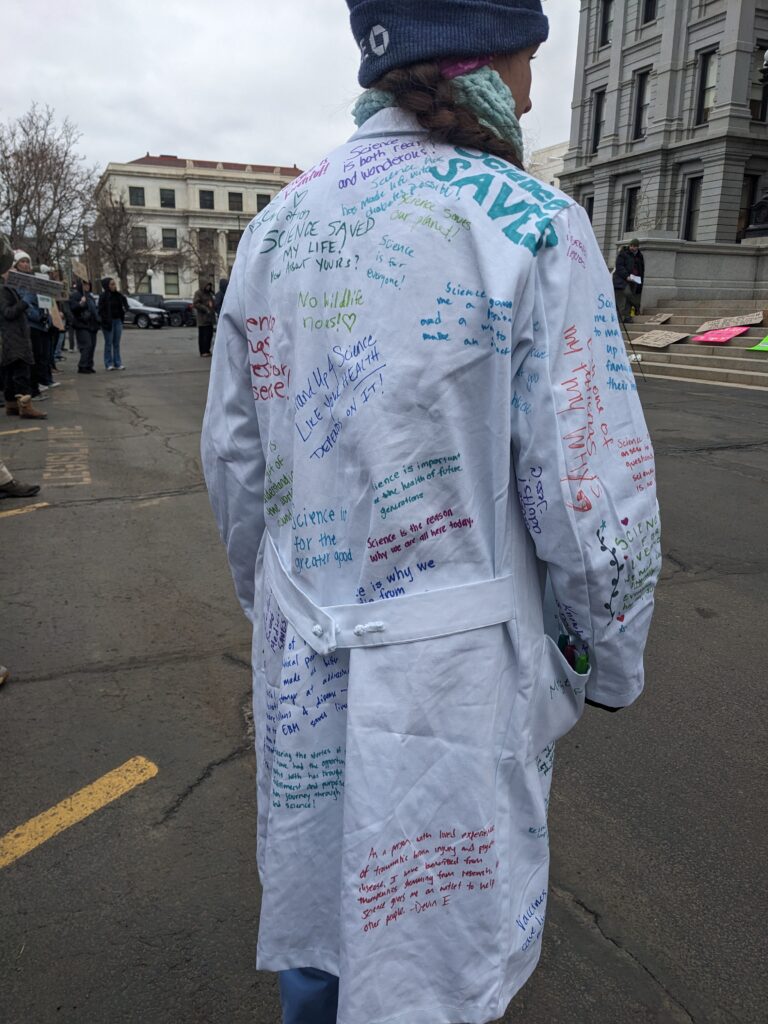
Bradley Allf, a science communicator and postdoctoral scholar in applied ecology at the University of North Carolina, described federal funding cuts as “a death of curiosity,” referencing Trump’s comments in his recent address to Congress about the endangered Delta smelt being a “useless fish” and Lesotho, Africa as “a country no one has ever heard of.” He emphasized the importance of curiosity for progress.
“Curious, tinkerers invented paper, the airplane, the smallpox vaccine and the internet. Other tinkerers built on these discoveries, adding layers and texture and depth to the intricate network of human knowledge.”
Update from San Francisco: Rally organizers started off by leading the crowd in a series of chants promoting science and unity among scientists.
“The United States is a global leader in science, but now one man with a sharpie wants to come along and sweep away eight decades of investment,” said Deborah Fischer, one of the organizers.
“We’re here today to say no to the destruction of science,” she said.
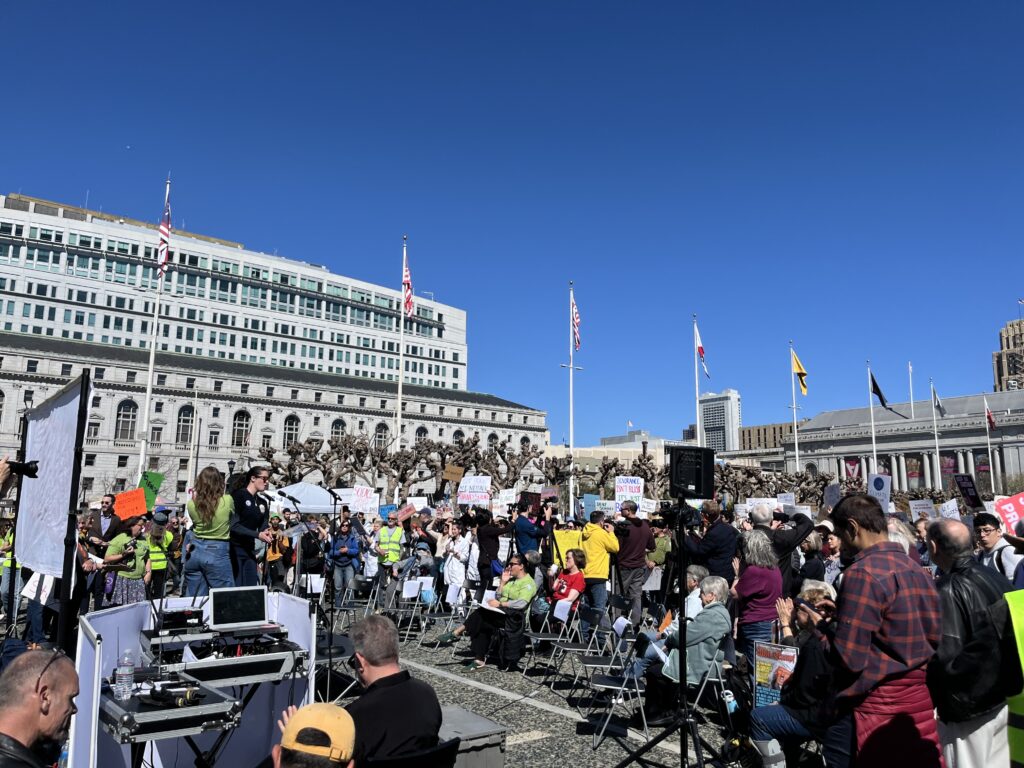
Update from Denver: “Tax the billionaires!” screamed an attendee at the Denver Stand Up for Science rally as Mike Nelson concluded his speech laying out how long it would take to give away a trillion dollars (at a million dollars a day, it would take about 3,000 years, by his calculations).
Nelson worked as a meteorologist for nearly 50 years before his retirement in December 2024. In his speech, he spoke about the dangers of climate change and the importance of limiting carbon emissions.
“The challenges we face will not be solved by firing park rangers and National Weather Service employees,” Nelson said.
Update from Boston: After the main crowd had dispersed, a group of about 30 rally-goers remained on the sidewalk across the street from the statehouse. One federal employee who preferred not to be named led a chant: “Boston is a science town!” Passing cars honked.
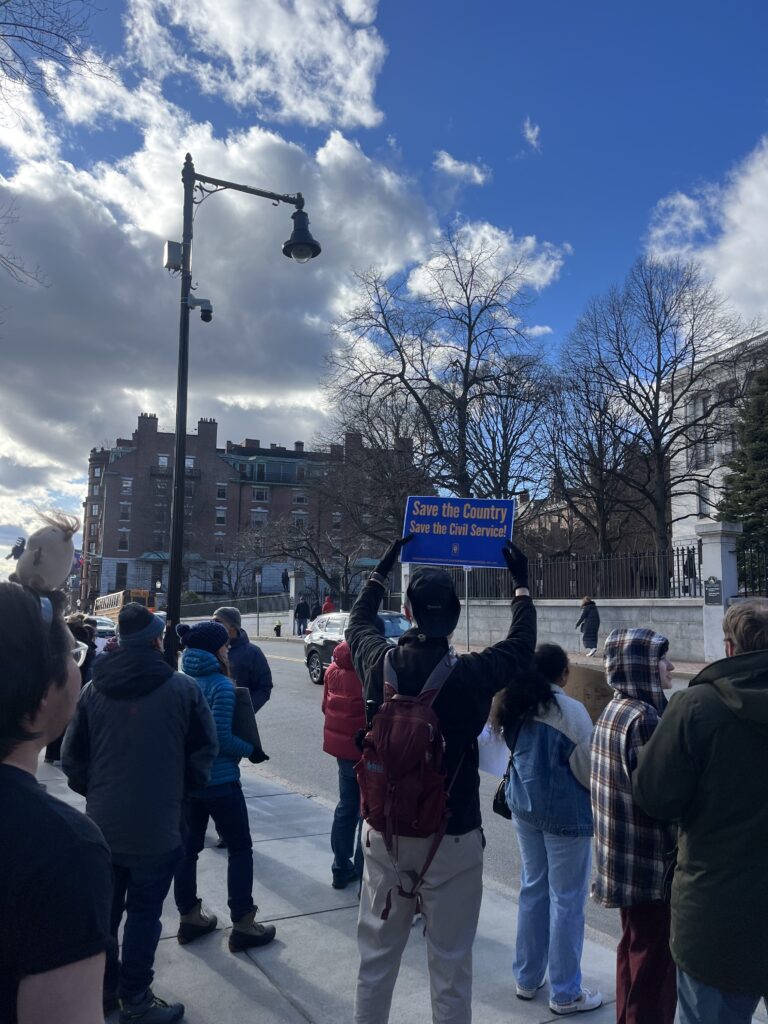
Andrew Zeiler, an undergraduate at Brandeis University, was one of those who remained. Zeiler said he was from a family of scientists and couldn’t miss the event. He is applying to graduate programs and is concerned that his prospects will be affected by funding uncertainties.
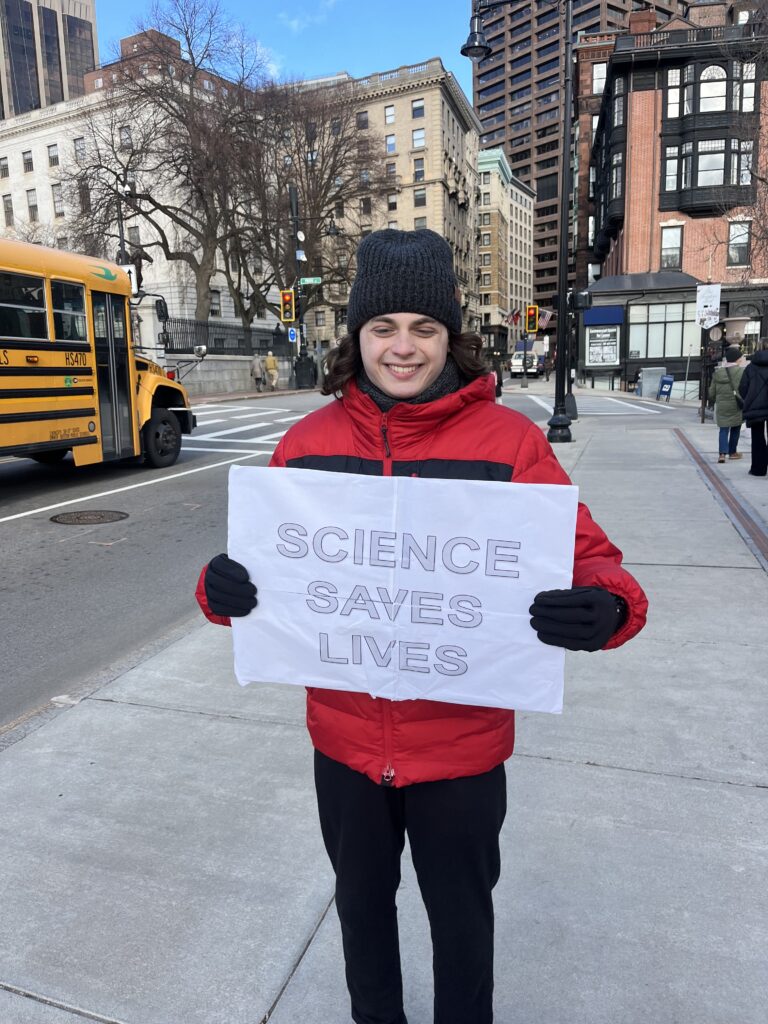
Update from Denver: As the rally began, organizer Sarah Senese, a Ph.D. student at the University of Denver studying organismal biology and ecology, emphasized that cuts to federal funding have effects that ripple far beyond the academic community.
In addition to students and academics, she noted the attendance of doctors, veterinarians, clinical workers, lab techs, and concerned citizens.
“Everybody here wants the same thing,” she said. “Blended, accessible, peer-reviewed science where they don’t tell us what we can and cannot write on grants, or they don’t tell us when, and where our results can be published, and where information is spread freely and equitably.”
Next, Colorado State Senator Lisa Cutter spoke about how her high school science teachers instilled a lifelong love of science and expressed dismay that some people deny the existence of climate change.
“Ignoring science won’t solve climate change,” Cutter said. “Acting on it will.”
Update from San Francisco: It’s a sunny afternoon on the West Coast and a crowd is starting to gather next to San Francisco City Hall. Rally-goers are putting last-minute touches on their signs and sound checks are starting to crackle and boom.
Caitlin Reavey, a geneticist, is here to make sure scientists are visible. “I got my PhD from NIH funding,” she said. “It’s so important to me that we represent the importance of science.”
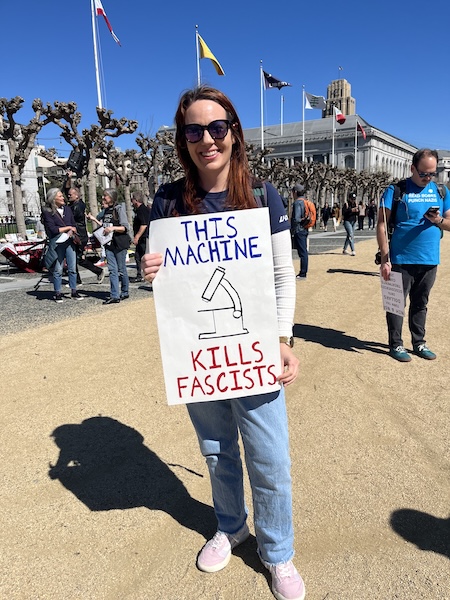
Update from Denver: Sign, sign, everywhere a sign.
Update from Washington, D.C.: The headline speaker here in D.C. was Bill Nye, “The Science Guy”—science educator, advocate, author, and CEO of the Planetary Society.
The crowd went wild.
“Science is part of the American story,” Nye declared. “If the United States is to lead the world, science cannot be suppressed. So today, my friends, we demand that scientists not be censored; that there be legal safeguards to prevent political interference in their research; and that they be allowed to communicate their results freely.”
“We demand that all of us in the public have access to scientific information, reports, and resources that were available before this president swore to uphold the U.S Constitution in January of this year,” Nye declared. “This is our right. We paid for this science with our tax dollars.”
“My friends” Nye continued, “science is in the national interest. Censoring science is not. I encourage those on the other side [of the aisle] to break ranks. Become leaders.”
Nye concluded his remarks by saying, “Each of us wants a better future for ourselves and for our families. Together we can, and we must, stand up for science.”
Nye drew the largest crowds and cheers of the day, with folks chanting, “BILL! BILL! BILL! BILL!” as he left the podium. The emcee called out a sign that read “Bill Nye taught us better than this.”
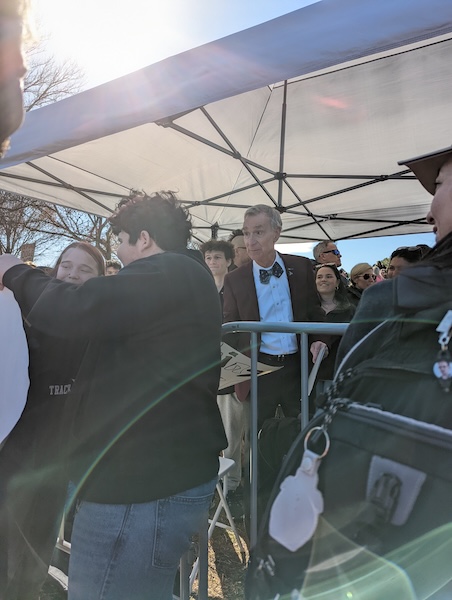
Update from Denver: David, who preferred not to share his last name, is a computer scientist whose work has been impacted by the federal government’s freeze on foreign assistance.
“It’s easy to feel helpless against such big and monstrous obstacles,” he said. “[Attending this rally] is one thing to help gain a little bit of peace of mind, I think. And especially to see that there are other people [with similar concerns] is sort of mentally reassuring to me.”
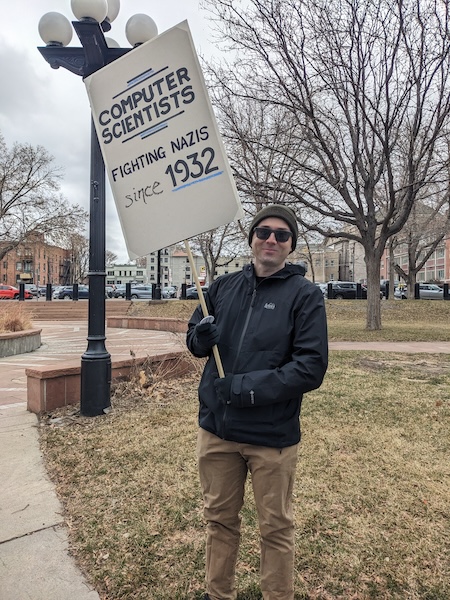
Update from Boston: The Boston rally began to disperse after Kylie Bemis, a professor of computer science at Northeastern University and the event’s the final speaker, concluded her remarks. Organizers urged attendees to contact their elected officials with their concerns about science funding.
Update from Birmingham: Rally attendees stressed the economic importance of the University of Alabama to the region.
Update from Denver: It’s below freezing in Denver, but scientist-organizers are already starting to gather for the Stand Up for Science rally at the Colorado State Capitol, cupping hot cups of coffee and holding signs under their arms.
Etienne Ruby, a postdoctoral researcher studying population dynamics at the University of Colorado, Boulder (UC Boulder) said he is here to “show the voice of the young scientists. To show that the stuff that not only I do, but that society needs, in a way, matters.”
His colleague Edgart Flores, a postdoctoral researcher in oceanography at UC Boulder, agreed. “I can’t listen anymore to ‘Climate change isn’t real’,” he said. “Science is necessary for society.”
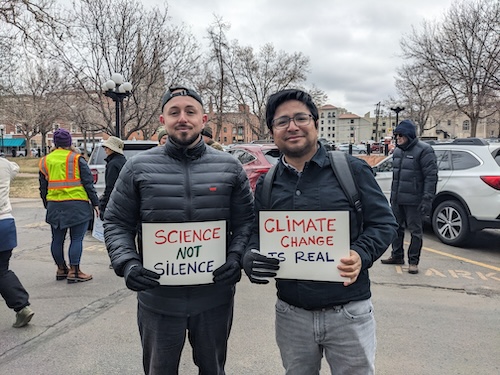
Update from Madison:
Update from Boston: Daniel Shen, a graduate student at the Massachusetts Institute of Technology and chief steward of the MIT Graduate Student Union, energized the crowd, many of whom have been standing in the cold for more than two hours. He started his speech with a chant: “Who’s got the power? We’ve got the power! What kind of power? People power!”
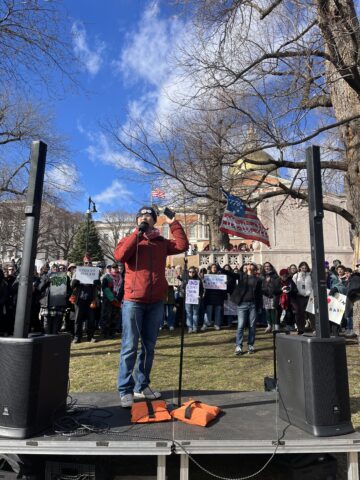
Shen, who works on clean energy research, is funded by NSF grants, he said. “In my own work, I look at how we can build more clean electricity … But the Trump administration has instead chosen to freeze millions that could drive that work forward. They have put the profits of a few billionaires over the health of our communities and our planet.”
Update from Chicago: It’s chilly in the Windy City, but scientists stood up in Chicago’s Federal Plaza.
Update from Washington D.C.: “I’m proud to be here with all you mad scientists,” said U.S. Senator Chris Van Hollen (D-Md). Van Hollen riled up the crowd against Elon Musk and DOGE. He thanked the judge who prevented the administration from halting NIH clinical trials in progress and judges who have reversed illegal firings at NIH and NSF.
Van Hollen led a call to action for people to call their representatives and attend town halls to encourage elected officials to stand up to the administration’s anti-science agenda, which he called “the illegal Musk operation.” Cheers for his speech were the second loudest of the day (second to Dr. Collins, who continues to cheer at the front of the crowd).
Update from Washington D.C.: Sign, sign, everywhere a sign.
Update from Washington D.C.: Former NASA administrator, U.S. Senator, and former astronaut Bill Nelson took the stage to speak out in support of NASA. He recalled the DART mission and other planetary protection efforts, his experiments in space to understand the effects of zero-g on the human body, and NASA’s climate science missions.
The crowd, now several thousand strong, cheered loudly for NASA climate science and Nelson’s calls for unity, regardless of borders or political decisions, in the advancement of science. (No one cheered louder than previous speaker Dr. Francis Collins, who snuck to the front of the crowd after his speech was over to watch Nelson speak.).
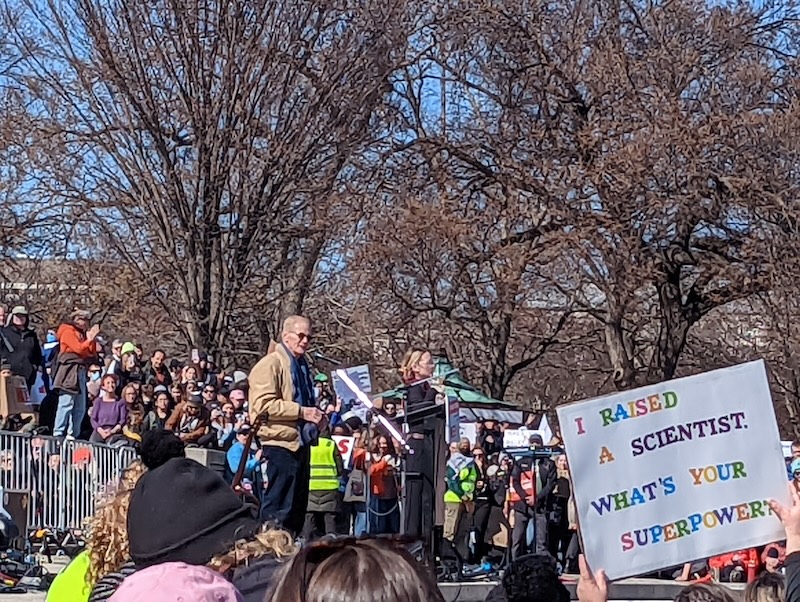
Update from Boston: The crowd in Boston hollered in support of Catie Kean, another Tufts undergraduate speaker who emphasized the impact of funding cuts on early-career researchers. “The outlook for the GRFP is bleak,” Kean said, referring to NSF’s Graduate Research Fellowship Program, a competitive grant that funds about 2,000 graduate students per year.
“Young people deserve better,” she said. “These personal impacts have been highly disturbing…however, they are far from the worst damage inflicted. I am privileged to not be a student whose summer or post bac program was canceled, a student whose graduate school acceptance was rescinded, a post doc wondering if their next paycheck will come, one of thousands of probationary employees who were abruptly fired, an untenured faculty within the NIH or NSF who has been or is in danger of being fired, or a PI with a grant that was terminated for suspected DEI sympathies.”
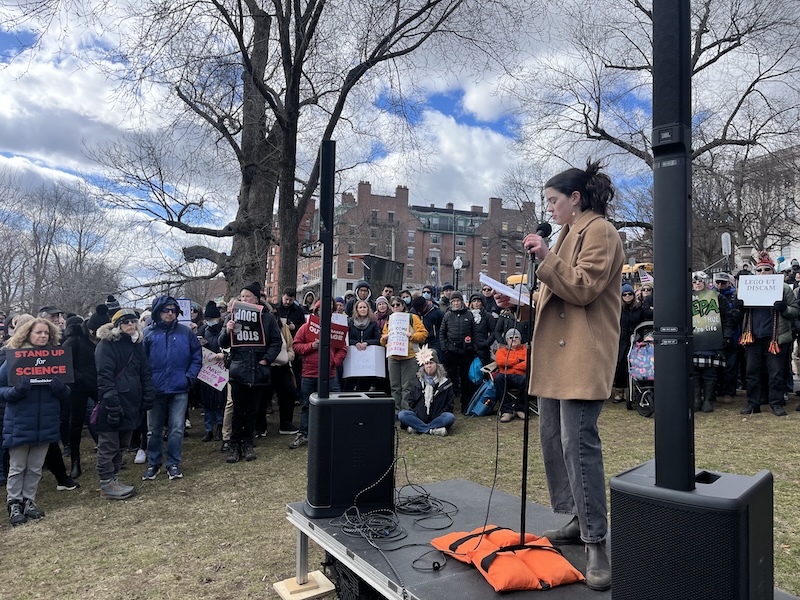
Spotted on Washington, D.C., metro:
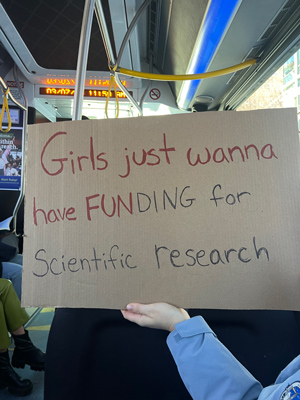
Update from Washington D.C.: On the funding freezes, firings, and censorship at the NIH, Dr. Francis Collins, former head of the NIH and head of the human genome project, said, “‘Moving fast and breaking things’ might be an appropriate mantra for Silicon Valley, but when the decisions will potentially disruspt an institution with a stunningly positive track record that protects the future health of our nation, let’s go with ‘first do no harm.” He then grabbed his guitar and led the crowd in a rowsing folk song with lyrics modified to support science.
“This is a song for all the good people. We’re joined together by this noble dream!” The crows sang. As Dr. Collins exited the stage, people chanted, “Francis! Francis! Francis!”
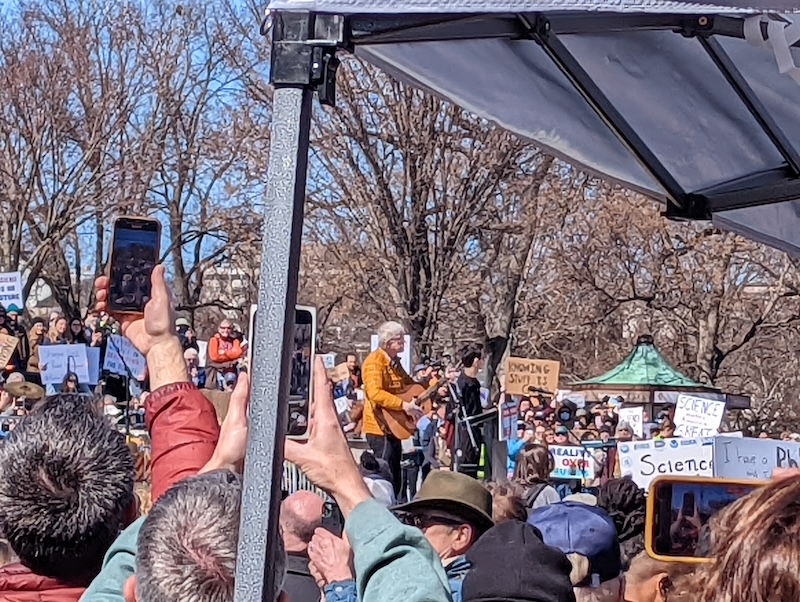
Update from Boston: Tufts University undergraduate Shoshana Daly is the first speaker at the Boston rally to give an early-career perspective. Planning to go into the medical field, Daly expressed worry that funding uncertainties will make achieving her desired career path impossible. “If we lose…federally funded medical and science training programs, we lose the future of science,” she said.
“Future generations of scientists deserve to be mentored. Future generations of scientists deserve to do science,” added Tufts University biologist professor Sarah Hengel. “We are in our documentary moment.”
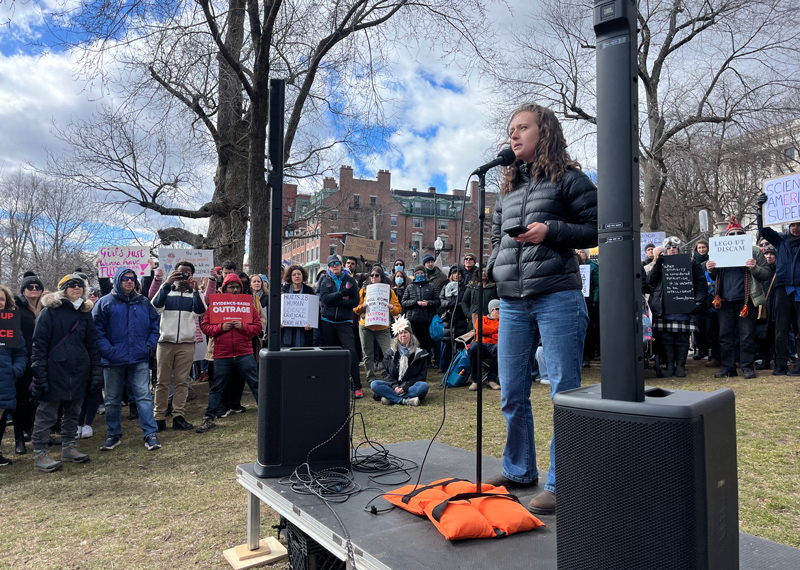
Update from Boston: Many of the speakers and attendees at the Boston rally work in healthcare or biotech and are mentioning NIH funding and the importance of basic research for medical advances in their speeches and on their signs.
“Nerd pride, I believe in it,” said Gary Ruvkun, a 2024 Nobel Prize Laureate in Physiology or Medicine and molecular biologist at Harvard Medical School. Ruvkin pointed to Kendall Square in Cambridge, MA—where many attendees work and the home of Massachusetts Institute of Technology—as an example of the economic prosperity that federal science funding brings.
“Government investments in the NIH have led to the scientific revolution. And we’ve gotten to live through that revolution,” he said.
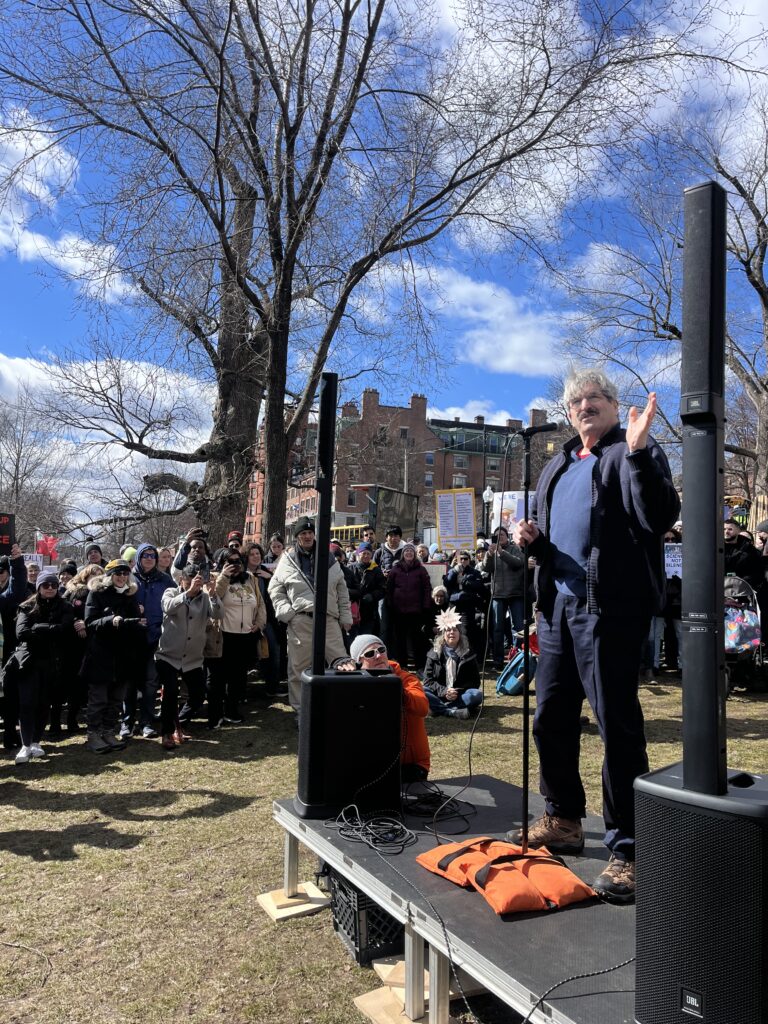
Update from Washington D.C.: One hour into the rally in D.C. and there are several thousand people gathered in front of the Lincoln Memorial and along the reflecting pool, cheering along with calls to rally and defend science, to fight fascism, and restore scientific independence. The crowd boos RFK Jr., Elon Musk, DOGE and the illegal funding freezes experienced by NIH when they are mentioned.
“We discover together! We innovate together! We stand together!” chants the crowd.
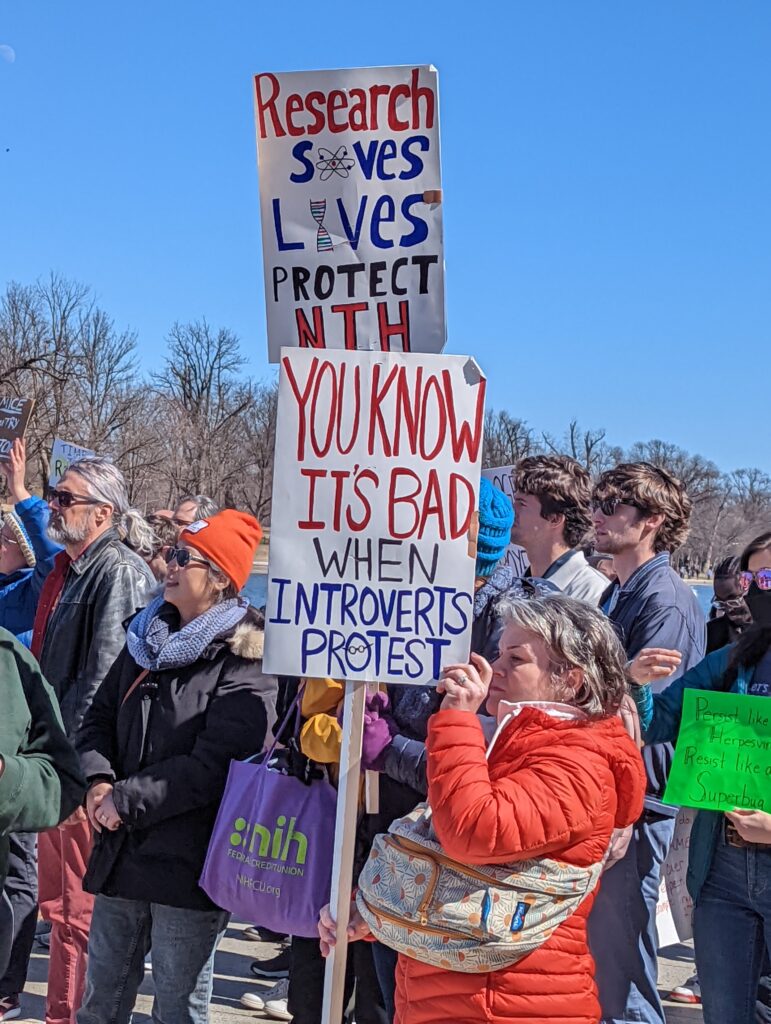
Update from Boston: Event speaker Marzyeh Ghassemi, a computer scientist at Massachusetts Institute of Technology, emphasized to the crowd the need for scientists to better communicate their work to the public. “Don’t be silent about communicating your science as widely as you can,” she said. “If people don’t understand, then they can’t tell their congresspeople not to do what they’re doing right now.”
Update from Washington D.C.: “United we fight. United we win. United we science!” said Gretchen Goldman, President of the Union for Concerned Scientists, to the crowd.
Update from Washington D.C.: “Hey nerds!” started Phil Plait, the first science speaker of the day. He started his speech recalling the exodus of science and scientists from past authoritarian regimes throughout history. His mentions of RFK Jr. and his anti-vax stances drew boos from the crowd, and a moment of silence for the two individuals in the United States who have died preventable deaths from the measles in the past week.
“We have to take science back!” Plait said.
Update from Boston: The crowd on the Boston Common, across the street from the Massachusetts statehouse, has grown to a few hundred people, many carrying signs in support of science and science funding. A singing group calling themselves the “Testable Hypotheses” just performed a brief tune titled “Stand Up for Science.”
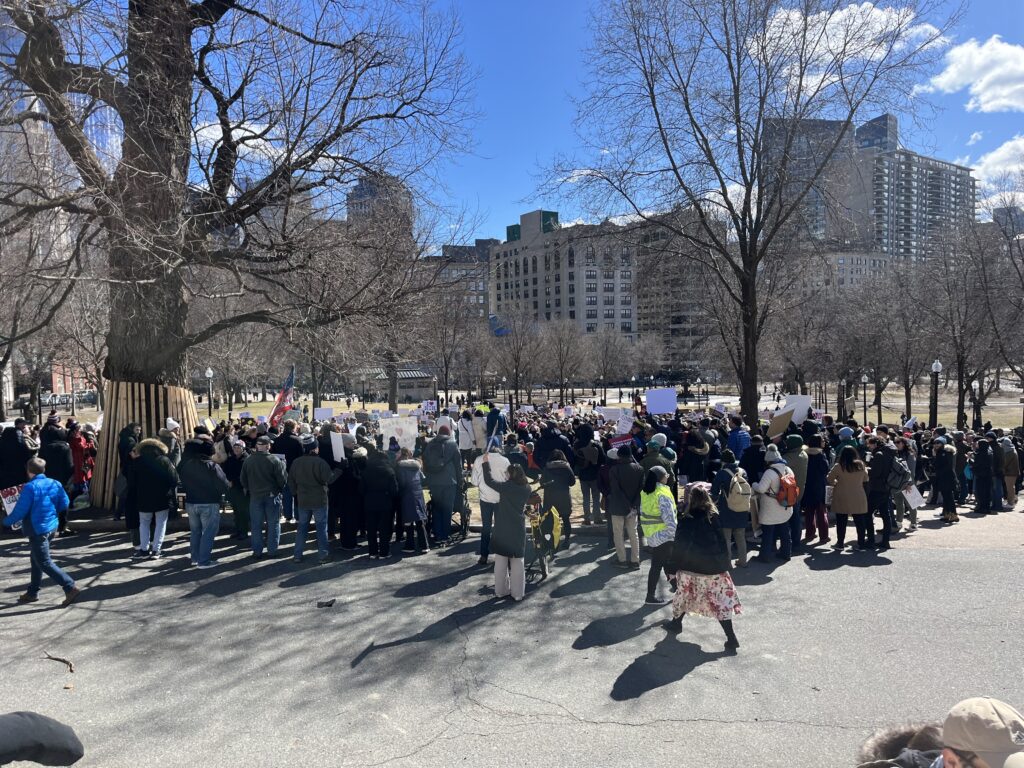
Claire Fecteau-Volk, a marine science student at the University of New England, attended the rally to express their frustration that the Trump Administration had pulled funding from Maine Sea Grant, a NOAA-funded research and education program. “I wanted to speak up about that,” they said. “And also, I want to be able to put ‘climate change’ in my proposals in the future, and not have my work be discredited because I want to talk about the climate. Shutting [scientists] out of the conversation is not going to help us in the long-term.”
Update from Washington D.C.: A crowd of several hundred people have gathered in from of the Lincoln Memorial and reflection pool to stand up for science. People continue to arrive and scheduled events are just beginning.
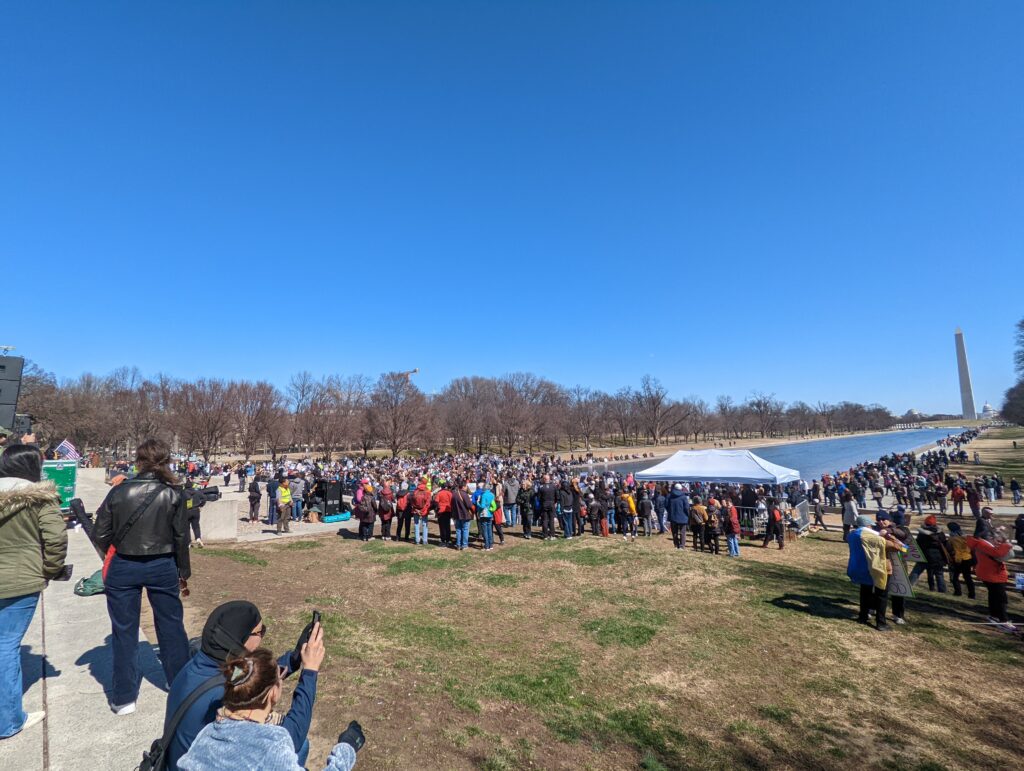
Update from Washington D.C.: It’s sunny here in D.C. but a brisk wind is keeping it chilly. The wind is also catching on American flags flying upside down, a signal of national emergency, and another flag proclaiming “This Sucks.”
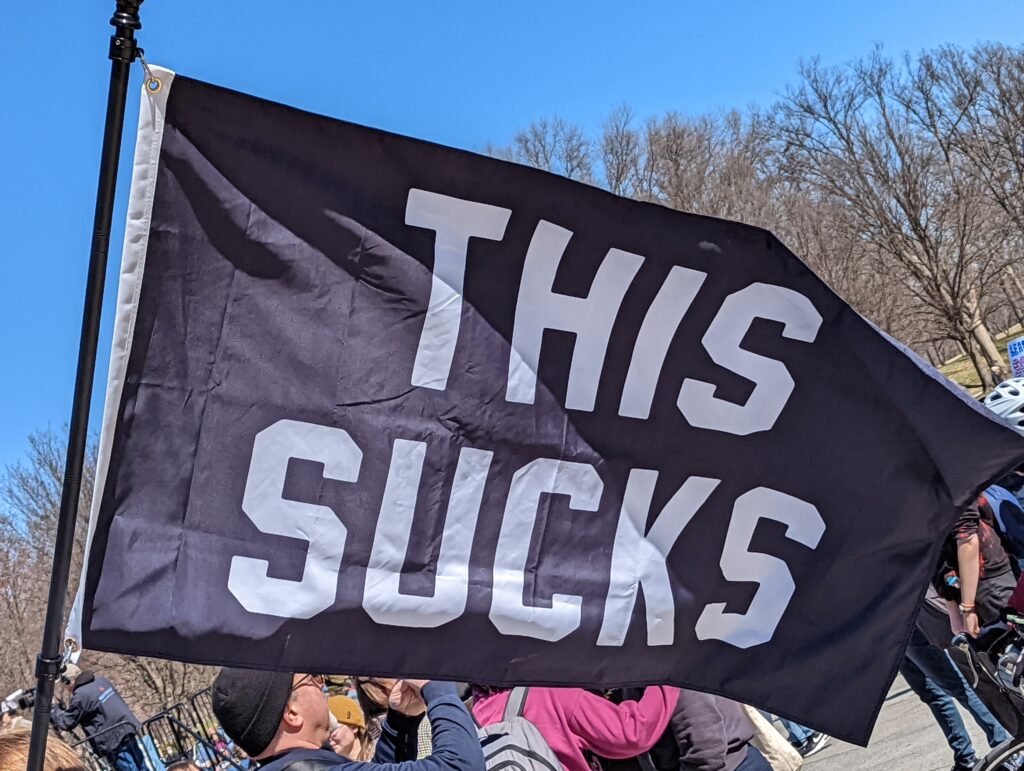
Update from Boston: Rally-goers kicked off their gathering with chants of “Scientists will not be silenced,” “Science saves lives,” and “3.14 fun science not war.”
Update from Boston: It’s a cold and very windy day at the Massachusetts statehouse, where rally-goers have begun to arrive. “There’s a lot of work that’s being threatened in Boston and elsewhere,” said Nick Weaver, a cancer researcher who is attending the rally with colleagues from his lab. “It feels like a war against science.”
Update from Washington D.C.: It’s 30 minutes before the scheduled start of the Washington D.C. rally and music is already playing at volumes that can be heard from a mile away at the closest train stop to the Capitol Building. A steady stream of foot traffic is heading toward the Lincoln Memorial. Some people are bearing signs decrying federal actions against science.
“Science saves lives. Trans rights are human rights,” said one rallygoer from Portsmouth, Mass., holding a sign that said “Billionaires don’t care if we die.”
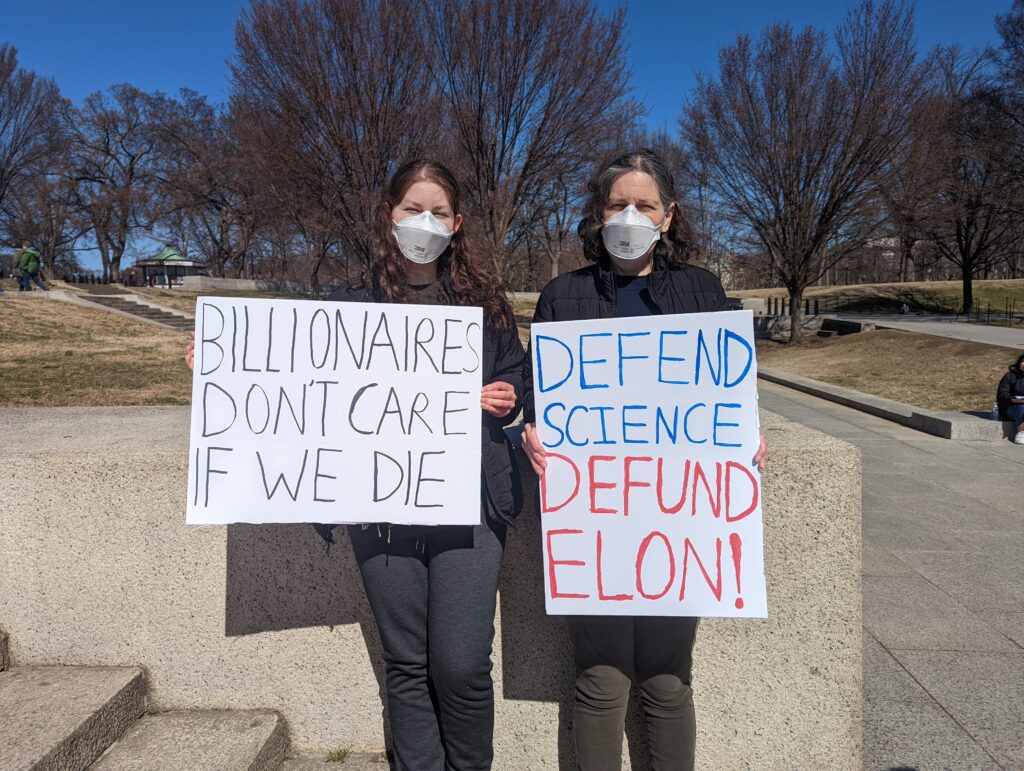
That person and their companion are not scientists, but are concerned with gro ing anti-science rhetoric and actions they’ve seen.
“It feels like a tsunami,” said another participant referring to the steady stream of executive orders and firings. She holds a sign reading “Defend science. Defund Elon.” She is at high-risk for breast cancer and is especially concerned that flu vaccine trials have been cancelled. The anti-trans actions also alarmed her, as her eldest child is trans.
Crowds continue to gather and sound checks are beginning.
Thousands of people across the United States plan to gather today in support of science. So-called Stand Up for Science rallies, organized by volunteers, are a response to widespread and rapid-fire moves targeting science and scientists following the inauguration of President Donald Trump in January.
During the past several weeks, the Trump administration has ordered federal science agencies to stop researching, funding, communicating, and hosting data on topics that do not align with the White House agenda. Much of that agenda is based on debunked science or outright false information.
Science agencies, including the National Science Foundation, EPA, and NOAA, have collectively fired hundreds of employees. Remaining staff have seen their government-issued credit cards effectively frozen, leaving them unable to pay for analyses, travel, and supplies needed to continue their work.
Among the scientific fields targeted are climate science; diversity, equity, inclusion, and accessibility; gender affirmation; social and environmental justice; vaccine science and public health; weather and climate forecasting; clean air and water regulations; and cybersecurity. These actions have hurt the science community and general public.
“Science is for everyone. Science keeps us safe, and enables us to live longer, healthier lives,” wrote the leadership of Stand Up for Science. “We call on leaders at every level, regardless of political affiliation, to champion and protect scientific research, education, and communication—for the progress, prosperity, and well-being of all.”
Calls to Action
Inspired by the 2017 March for Science during the first Trump administration, Stand Up for Science organizers are urging policymakers to secure and expand scientific funding; to end censorship and political interference in science; and to defend diversity, equity, inclusion, and accessibility in science.
Official rallies are planned in Washington, D.C., and in 31 other cities across the United States. Similar events have sprung up in more than 100 other U.S. locations and in Europe, too. Scientists, science communicators, educators, elected officials, activists, and health care patients are scheduled to speak.
Ahead of his speech at the Washington, D.C., rally, astronomer and science communicator Phil Plait told Eos he will speak “about the attacks on science of the current administration and how that has echoes in history that are very relevant today.”
Plait plans to call attention to the impact of funding cuts and research censorship on the National Institutes of Health, the National Science Foundation, and universities and remind people about how similar attacks on science unfolded throughout history.
“We saw this happen in Nazi Germany and Stalinist USSR, with scientists fleeing, exiled, or imprisoned, and those countries suffered greatly because of it,” Plait said. “I do not want that to happen here.”
“My biggest concerns as a citizen and human being are the wholesale attacks on medical science,” Plait said.
“My hope is that people will get a renewed sense of how science is massively important to everyone and how we must vigorously speak out to defend it.”
In particular, he denounced Robert F. Kennedy Jr., secretary of health and human services, as a “crackpot.”
“He is an anti-vaxxer, he promulgates long-debunked medical quackery, and he is actively undermining critical medical research,” Plait said. “Because of this, people will die.”
Stand Up for Science organizers estimate that the main rally in Washington, D.C., will draw around 10,000 people to the National Mall.
“My hope is that people will get a renewed sense of how science is massively important to everyone and how we must vigorously speak out to defend it,” Plait said. “I want people to be inspired and motivated to make their voices heard, to call their government representatives, and to make sure the United States doesn’t go any further down this very dark path it’s facing.”
Eos reporters will be covering rallies and updating this article as events unfold.
—Kimberly M. S. Cartier (@astrokimcartier.bsky.social), Staff Writer
Also contributing to this story were Eos staff writers Emily Dieckman, Jennifer Schmidt, and Grace van Deelen.



